By Ernest Kearney – In Fatherland, Stephen Sachs has taken a page from such “documentary plays” as Michael Hastings’ 1966 Lee Harvey Oswald: A Far Mean Streak of Indepence [sic] Brought on by Negleck [sic] an indictment of Oswald for the Kennedy assassination based on the transcripts from the Warren Commission, Eric Bentley’s 1972: Are You Now Or Have You Ever Been: The Investigations of Show-Business by the Un-American Activities Committee 1947–1958 and the 1979 Odyssey Theater Ensemble production of The Chicago Conspiracy Trial by Ron Sossi and Frank Condon.
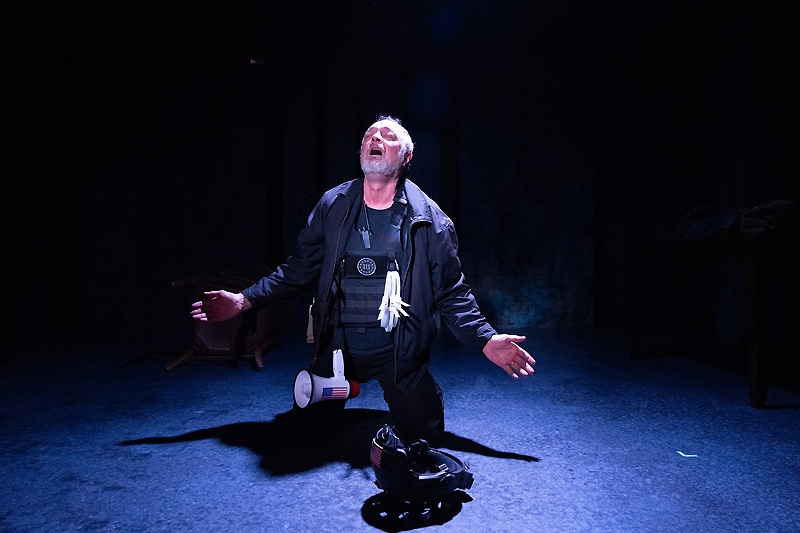
Unlike the three abovementioned plays, though drawn from trial transcripts, Sachs has not brought a sizable cast onto his stage as defendants but limited himself to the true story of 18-year-old Jackson Reffitt who would secretly record his father’s rantings about stolen elections as he followed the mendacity of Fox News and Donald Trump down the rabbit hole that led to the January 6th assault on the Capitol.
Young Reffitt would then notify the FBI of his father’s involvement with that event, providing them with the “surreal and scary” tapes he had made which resulted in his father Guy Reffitt being arrested.
Sachs’ play confines itself to four characters, the Father (Ron Bottitta), the Son (Patrick Keleher), the US Attorney (Anna Khaja) and the Defense Attorney (Larry Poindexter,); thus there is not the extensive pyrotechnics offered in the other plays. Fatherland presents the political-historical disaster we have all suffered through as a family drama, and regardless of how one feels about the ebbing down of these events to this scale, there is justification for it.
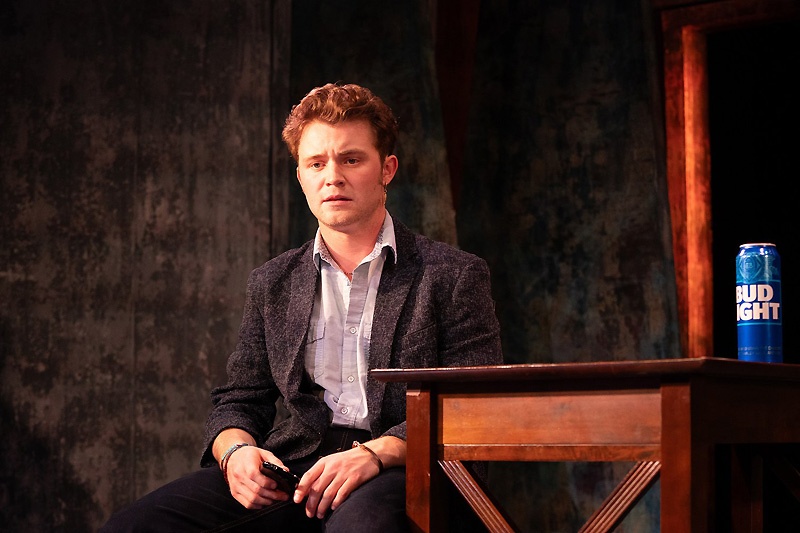
Not since the Civil War have families been so rent apart by issues; QAnon, the “Big Lie,” the “45th Apostle” we have all lost somebody to these.
It would not surprise me if Sachs was a devotee of Eric Hoffer (1902-1983), the “Longshoreman Philosopher” whose classic tome The True Believer (1951) is enjoying a renaissance, because Sachs’ play certainly echoes with Hoffer’s insights:
“Propaganda does not deceive people; it merely helps them to deceive themselves.”
“The true believer, no matter how rowdy and violent his acts, is basically an obedient and submissive person.”
“It is startling to realize how much unbelief is necessary to make belief possible.”
- “Absolute faith corrupts as absolutely as absolute power.”
- “It is when power is wedded to chronic fear that it becomes formidable.”
- “Self-righteousness is a manifestation of self-contempt.”
- “Passionate hatred can give meaning and purpose to an empty life.”
- “What starts out [in America] as a mass movement ends up as a racket, a cult, or a corporation.”
- “Mass movements can rise and spread without belief in a God, but never without belief in a devil.”
- “It is by its promise of a sense of power that evil often attracts the weak.”
- “Should Americans begin to hate foreigners wholeheartedly, it will be an indication that they have lost confidence in their own way of life.”
Whether or not Sachs knows of Hoffer, his play does encapsulate his works, because both have concentrated the historical to the humanity into its essence. Fatherland is not about the national tragedy we are experiencing but the collateral damage of that event.
For some that may make Fatherland dramatically-lite, but Sachs, (who directed as well as conceived this effort), has taken the steps needed to diminish that criticism.
First, as with all stagings at the Fountain Theatre, the casting is superlative. Bottitta and Keleher capture the grief of the father and son who are losing themselves and each other in the torrents of a historical tsunami.
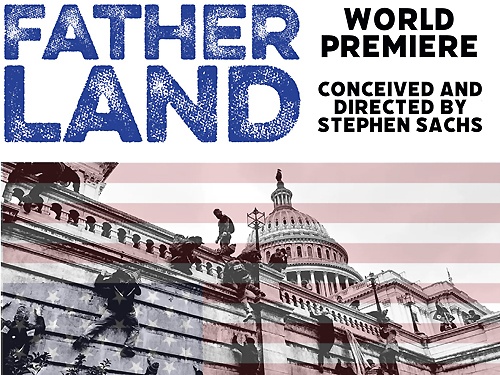
Keleher embodies the youth who must be an adult before his time, and yet cannot stop being the child of the man he is either betraying or saving. And salvation is in question, as the son sees his father walking about the house wearing his bullet-proof vest and hinting of “something big” coming.
Bottitta touches all the bases as he spirals down into the abyss of the conspiracy minded. And when it comes time to recount the events of January 6th, Bottitta rages about the stage like a one-man blue-collar Jacquerie, fully convincing the audience he could have stormed the capitol single-handedly.
The entire action of the play occurs in the court room where the father is being tried, and so it is fitting that the two attorneys should serve as dueling deux-ex-machinas with their closing statements.
Poindexter’s defense attorney wins this bout by a decision, as he’s able to stir more outrage over the betrayal of a family member than Khaja’s prosecutor is over the betrayal of country. An outcome that did not sit well with this reviewer.
But that is understandable. I see a dark future ahead, a battle for the soul of this nation and my vision is that of the historian. Sachs sees in the same events a family in need of healing, his vision is that of the humanitarian. I don’t know whether Sachs’ judgment or mine will inevitably prevail, but Fatherland offers audiences a riveting Rorschach Test with which to determine their own verdict.
****
is onstage
Fridays & Saturdays 8pm
Sundays 2pm
Pay What You Want Mondays 8pm
Running Time: 75 minutes (no intermission)
THRU Sunday, May 26, 20242:00 PM
5060 Fountain Avenue
Los Angeles, CA, 90029
****
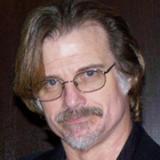





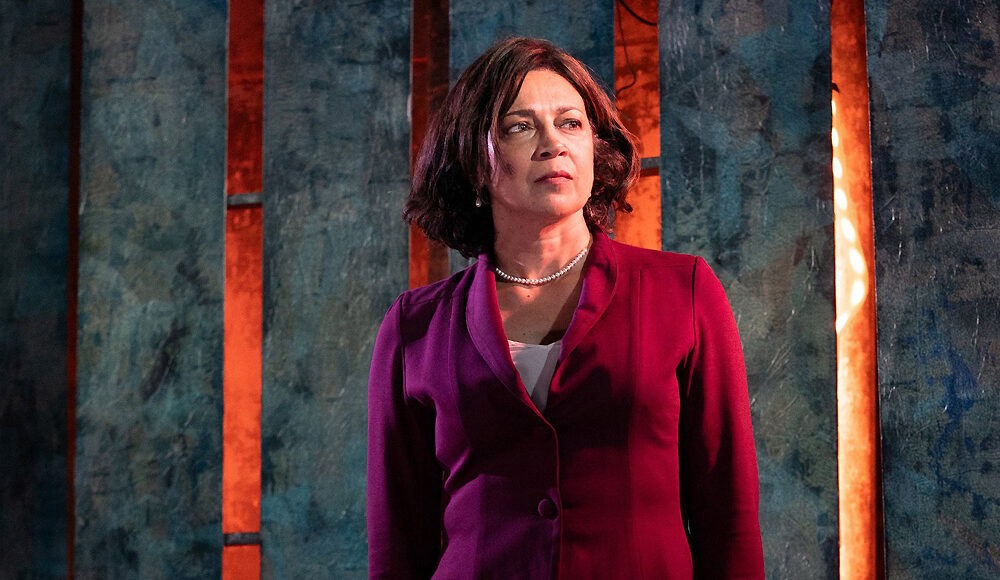
joe | March 17, 2024
|
Hoping they do a show about how Stalin and mao rewarded children for turn ingtheir parents in for crimes against the state.
ernest kearney | March 20, 2024
|
I’d review it.